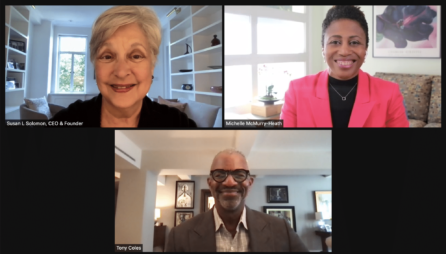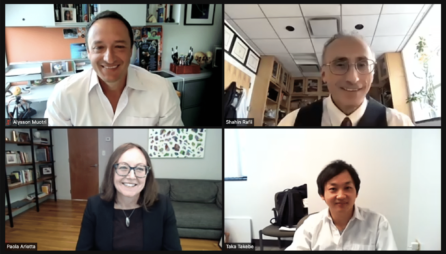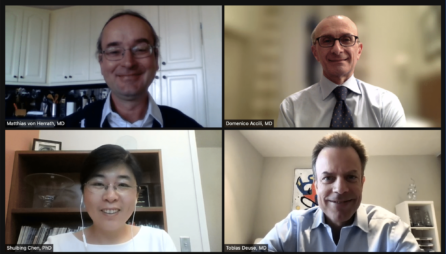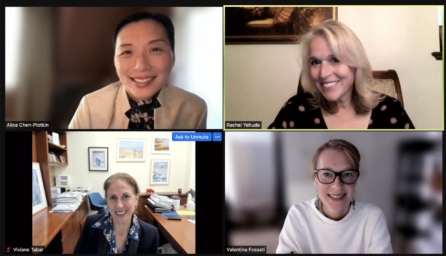Translating Discoveries into Medicine, Advancing Equity in Science, and New Cancer Therapies: Watch Highlights of the 2021 NYSCF Conference
News VideoOn October 19th and 20th, we hosted the sixteenth annual NYSCF Conference on translational stem cell research. This year’s meeting, held virtually for the second consecutive year due to the pandemic, was one of the most diverse and highly attended to date, hosting over 600 participants from academia, industry, government, nonprofits, and patient groups. World-renowned multi-disciplinary speakers presented their latest findings in translational stem cell research and shared exciting stories of taking their discoveries all the way to the clinic. The meeting also featured several engaging panel discussions on critical and timely topics, such as new avenues for precision cancer therapies and how to advance the values of diversity, equity, inclusion and belonging (DEIB) in the STEM workforce.
Stem Cells at the Genesis of New Therapeutic Strategies for Patients
The conference was kicked off by keynote speaker Derrick Rossi, PhD, founder of Moderna Therapeutics, NYSCF–Robertson Investigator Alumnus, NYSCF Board Member, and CEO of Convelo Therapeutics. Derrick shared his perspective as a stem cell biologist turned biotech entrepreneur and recounted his journey with mRNA technology, from his lab’s discovery of a highly efficient method to reprogram human cells to pluripotency using synthetic modified mRNA in 2010, to the founding of Moderna Therapeutics and the lightning-fast development of mRNA COVID-19 vaccines. He also shared the story of how the case of “The Berlin Patient”, the first person in the world to be cured of HIV through a CCR5 Delta32/Delta32 stem cell transplant, inspired him to found Intellia Therapeutics, a company that develops CRISPR-Cas9 technology for gene editing and repair.
When asked about his motivation to work in all these areas, he stressed the importance of being inspired by the discoveries of others.
“This is what science does: it builds on the work of others to make an impact,” he remarked. “You read the literature and you get inspired to pursue ideas into uncharted areas.”
Opening New Avenues for Cancer Treatment
A panel of experts on cancer gathered to discuss the current challenges and opportunities in the treatment of solid tumors. Jose Conejo-Garcia, MD, PhD (Chair of the Department of Immunology at Moffitt Cancer Center), Laura Andres-Martin, PhD (Research Investigator in Oncology at the NYSCF Research Institute), Sohrab Shah, PhD (Chief of Computational Oncology at Memorial Sloan Kettering Cancer Center), and Padmanee Sharma, MD, PhD (Professor of Genitourinary Oncology at MD Anderson Cancer Center) discussed how mechanisms of tumor immune evasion are profoundly distinct depending on the etiology of the cancer, how being able to study the immune response dynamically and in real time in patients will be critical to unravel how drug resistance arises, and how the tumor microenvironment (cell-cell interactions and signaling, pH, oxygen levels, etc.) contributes to the evolution of cancer and its response to therapies. They also stressed the importance of deciphering the tumor environment in solid tumors, since their characteristics are very different from liquid tumors – a possible explanation for why cellular therapies like CAR-T cells have failed against solid tumors.
Exciting prospects for precision therapies were also debated, including cancer vaccines, combination therapies to overcome resistance and treat unresponsive tumors, and NYSCF’s own efforts to develop ovarian cancer organoids for modeling patient-specific therapeutic responses.
Fostering Diversity, Equity, Inclusion, and Belonging (DEIB) in STEM
Promoting equity in the scientific workforce is mission-critical to NYSCF, not only because it is unjust that certain groups continue to be systematically marginalized in the STEM research community, but because the greatest innovations happen in diverse, inclusive, and equitable environments. This year, we convened a panel of staunch DEIB advocates representing various positions in the research ecosystem dedicated to fostering DEIB: Jean Shin, PhD (Chief Officer for Scientific Workforce Diversity (COSWD) at the NIH), Valentina Greco, PhD (Carolyn Walch Slayman Professor of Genetics at Yale University), Shane Liddelow, PhD (Assistant Professor at NYU Grossman School of Medicine), and Carolyn Rodriguez, MD, PhD (psychiatrist and Associate Professor at Stanford University).
Panelists engaged in an insightful and inspiring discussion on the structural barriers that have led to a lack of diversity in the STEM community, raised awareness of the unique challenges faced by minoritized individuals and the implicit biases that continue to influence our actions, and highlighted ongoing efforts for change. Among the many strategies that were shared for creating a more inclusive environment, panelists emphasized that we must improve accountability in institutions to ensure DEIB efforts and policies are being implemented from the top down. The speakers also underscored the importance of allyship from those in positions of power or privilege, including listening carefully to the experiences of minoritized individuals. For minoritized individuals, they emphasized the power of mentorship, having more than one mentor to rely on for various types of support during an individual’s career, and the value of joining supportive communities and associations.
To help all of us continue our education on this mission-critical topic, please see this collection of DEIB resources shared during the panel discussion.
The Road Ahead for Translational Research: Lessons Learned and a Vision for the Future
How can we more effectively translate discoveries into therapies? How can we advance health equity and ensure all communities have access to breakthroughs? These topics were discussed at the plenary session, where NYSCF’s CEO Susan L. Solomon, JD, was joined by Tony Coles, MD (CEO of Cerevel Therapeutics), and Michelle McMurry-Heath, MD, PhD (President & CEO of Biotechnology Innovation Organization). These experts drew on their extensive experience accelerating biomedical progress across academia, government, and industry to share their perspective on the present and future of translational research.

Panelists reflected on the lessons learned over the pandemic and acknowledged that the speed of transformation in the scientific field (which Dr. Coles dubbed “the platinum age” of science) is what is enabling progress around the globe, but that we need to fight additional battles at the same time.
“The suspension of facts and data is one of the most troubling trends of the last decade or so…we’ve lost something as a society and it has compromised the greater public health good,” said Dr. Coles.
“What we learned over this last year and a half is that science is fast – faster than we ever dreamed possible, and that the major barriers that remain between where we sit today and better innovations for patients are mostly political and social, not scientific,” noted Dr. McMurry-Heath.
Both agreed that we need to equip young scientists and clinicians with tools to become activists that fight to remove political, regulatory, and social barriers that stand in the way of realizing the full potential of scientific discovery and ultimately benefit human life.
Scientific Session Highlights
Advanced Organoid Models of Disease

We learned about Alysson Muotri, PhD’s (Professor at the University of California, San Diego) groundbreaking work to grow brains in a dish and his ongoing efforts to mature brain organoids by coupling them to robots that provide organoids with input signals from the environment. NYSCF – Robertson Stem Cell Investigator Takanori Takebe, MD, PhD (Assistant Professor at the University of Cincinnati and Professor at the Tokyo Medical and Dental University), shared his lab’s latest advances in building human hepato-biliary-pancreatic organoids from pluripotent stem cells to study endoderm organogenesis and disease. Lastly, Shahin Rafii, MD (Professor at Weill Cornell Medicine), discussed his new technology for adding a vascular system to organoids of any kind, dramatically improving the applicability of organoid research by more accurately recapitulating physiological conditions, and his collaboration with NYSCF to bring this technology to ovarian cancer organoids.
Diabetes & Immunology

Speakers presented exciting proof-of-principle studies that are paving the way for clinical application. Matthias von Herrath, MD (Professor at La Jolla Institute for Immunology and Vice President and Head of NovoNordisk’s diabetes R&D Center in Seattle), shared insights into how beta cells reveal themselves to the immune system by increasing MHC class I expression, arguing that it is critical to have a beta cell-centric view of the pathogenesis and treatment for type 1 diabetes. Domenico Accili, MD (Russell Berrie Foundation Professor of Diabetes, and Chief of the Endocrinology Division at Columbia University), discussed his discovery that FoxO1 inhibition converts gut endocrine cells into functional insulin-producing beta cells, and his work to take this finding to the clinic. Tobias Deuse, MD (Professor of Surgery at the University of California San Francisco), shared his ongoing research to engineer hypoimmune universal cell products for cell replacement therapies that do not require immunosuppression.
Regeneration & Rejuvenation
Lee Rubin, PhD (Professor at Harvard University), discussed his lab’s ongoing efforts to tackle neurodegenerative diseases via their aging components. Their current work shows that young blood contains factors not present in old blood which stimulate neurogenesis and rejuvenate the neuro-vascular niche. NYSCF – Robertson Stem Cell Investigator Ya-Chieh Hsu, PhD (Professor at Harvard University), presented her approaches to model both transient acute stress and long-lasting chronic stress on skin stem cells, uncovering that stress-induced neuronal activity drives rapid loss of melanocyte stem cells, leading to premature hair graying. Krishanu Saha, PhD (Associate Professor at the University of Wisconsin-Madison), shared important advances in biomanufacturing which allow nanoparticles to edit the genome of adult human cells, opening up an array of potential therapeutic applications. Finally, Celia Witten, MD, PhD (Deputy Director of the Center for Biologics Evaluation and Research (CBER) at the FDA), provided an FDA update on the regulatory landscape for regenerative medicine, explaining how the pandemic has reshaped clinical trials.
Neurological Diseases

Rachel Yehuda, PhD (Professor at the Mount Sinai School of Medicine), shared impressive advances made in understanding PTSD and previously unknown genetic risk factors using stem cell-derived neurons through her collaboration with NYSCF. NYSCF’s own Valentina Fossati, PhD (Senior Investigator at the NYSCF Research Institute), presented her years of work to model the role of glia in neurodegenerative diseases by developing efficient methods to create glial cells from iPSCs, and integrate them into brain organoids to increase their complexity. Viviane Tabar, MD (neurosurgeon scientist and Chair of the Department of Neurosurgery at the Memorial Sloan Kettering Cancer Center), finished the session by discussing an ongoing clinical trial for Parkinson’s disease using iPSC-derived dopaminergic neurons, which has shown efficacy in a subset of patients with moderate/severe Parkinson’s.